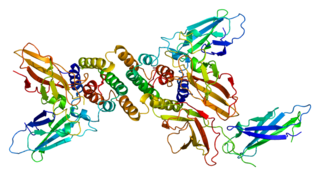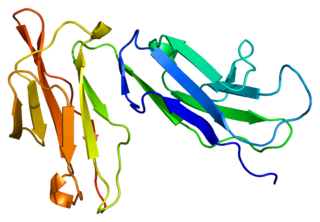Related Research Articles

The common gamma chain (γc), also known as interleukin-2 receptor subunit gamma or IL-2RG, is a cytokine receptor sub-unit that is common to the receptor complexes for at least six different interleukin receptors: IL-2, IL-4, IL-7, IL-9, IL-15 and interleukin-21 receptor. The γc glycoprotein is a member of the type I cytokine receptor family expressed on most lymphocyte populations, and its gene is found on the X-chromosome of mammals.
Allelic exclusion is a process by which only one allele of a gene is expressed while the other allele is silenced. This phenomenon is most notable for playing a role in the development of B lymphocytes, where allelic exclusion allows for each mature B lymphocyte to express only one type of immunoglobulin. This subsequently results in each B lymphocyte being able to recognize only one antigen. This is significant as the co-expression of both alleles in B lymphocytes is associated with autoimmunity and the production of autoantibodies.

T-cell surface glycoprotein CD3 gamma chain is a protein that in humans is encoded by the CD3G gene.

Low affinity immunoglobulin gamma Fc region receptor II-a is a protein that in humans is encoded by the FCGR2A gene.

Estrogen-related receptor gamma (ERR-gamma), also known as NR3B3, is a nuclear receptor that in humans is encoded by the ESRRG gene. It behaves as a constitutive activator of transcription.

Retinoic acid receptor gamma (RAR-γ), also known as NR1B3 is a nuclear receptor encoded by the RARG gene. Adapalene selectively targets retinoic acid receptor beta and retinoic acid receptor gamma and its agonism of the gamma subtype is largely responsible for adapalene's observed effects.

Interferon gamma receptor 1 (IFNGR1) also known as CD119, is a protein that in humans is encoded by the IFNGR1 gene.
T cell receptor gamma locus is a protein that in humans is encoded by the TRG gene, also known as TCRG or TRG@. It contributes the gamma (γ) chain to the larger TCR protein.

Immunoglobulin heavy constant alpha 1 is a immunoglobulin gene with symbol IGHA1. It encodes a constant (C) segment of Immunoglobulin A heavy chain. Immunoglobulin A is an antibody that plays a critical role in immune function in the mucous membranes. IgA shows the same typical structure of other antibody classes, with two heavy chains and two light chains, and four distinct domains: one variable region, and three variable regions. As a major class of immunoglobulin in body secretions, IgA plays a role in defending against infection, as well as preventing the access of foreign antigens to the immunologic system.
Immunoglobulin heavy locus, also known as IGH, is a region on human chromosome 14 that contains a gene for the heavy chains of human antibodies.
T cell receptor delta locus, also known as TCRD or TRD@, is a protein that in humans is encoded by the TRD gene. It contributes the delta (δ) chain to the larger TCR protein.

Ig epsilon chain C region is a protein that in humans is encoded by the IGHE gene.

Ig gamma-2 chain C region is a protein that in humans is encoded by the IGHG2 gene.

Fc fragment of IgG receptor IIb is a low affinity inhibitory receptor for the Fc region of immunoglobulin gamma (IgG). FCGR2B participates in the phagocytosis of immune complexes and in the regulation of antibody production by B lymphocytes.

Interleukin-2 receptor subunit beta is a protein that in humans is encoded by the IL2RB gene. Also known as CD122; IL15RB; P70-75.

TCR gamma alternate reading frame protein, also known as TARP, is a human gene.

T cell receptor gamma variable 9, also known as TRGV9, is a human gene.

High affinity immunoglobulin gamma Fc receptor I is a protein that in humans is encoded by the FCGR1A gene.

T-cell surface glycoprotein CD3 delta chain is a protein that in humans is encoded by the CD3D gene.
T-cell receptor alpha locus is a protein that in humans is encoded by the TRA gene, also known as TCRA or TRA@. It contributes the alpha chain to the larger TCR protein.
References
- ↑ "Entrez Gene: T cell receptor gamma variable 1 (non-functional)" . Retrieved 2014-02-05.